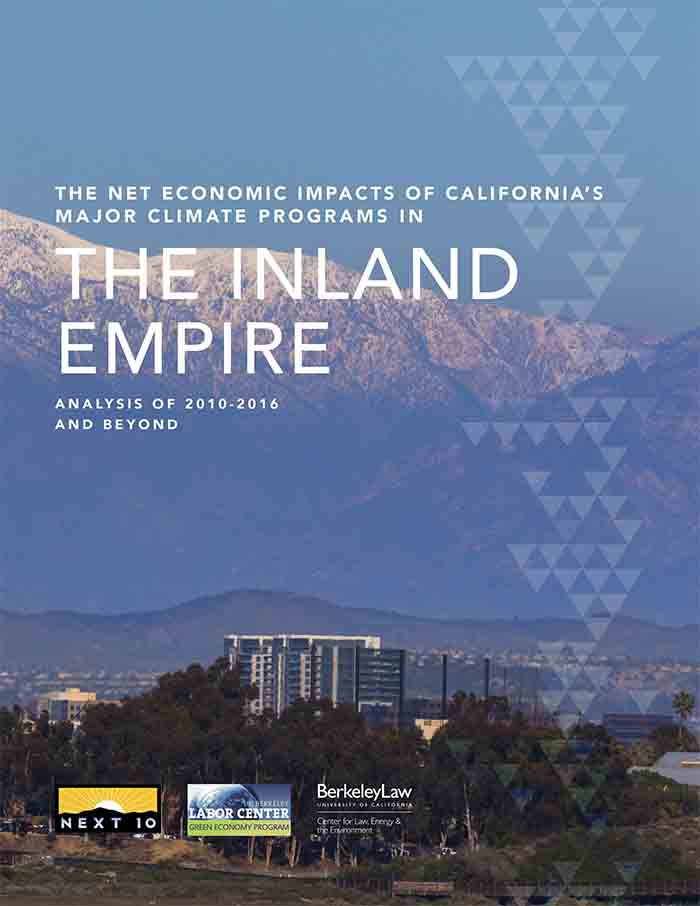August 2017

Following the state legislature’s landmark approval extending California’s cap-and-trade program through 2030 by a supermajority vote, CLEE and its research partners have completed the first comprehensive, academic study of the economic effects of existing climate and clean energy policies in Southern California’s Inland Empire. Together with UC Berkeley’s Center for Labor Research and Education, and working with the nonpartisan nonprofit Next 10, the study estimated a net benefit of $9.1 billion in direct economic activity and 41,000 net direct jobs from 2010 to 2016 in the region, some of which are permanent and ongoing and many of which resulted from one-time construction investments.
The study focused on San Bernardino and Riverside Counties, which both face unique economic and air-quality challenges. The report analyzed not only the benefits of California’s climate and clean energy policies, but also compliance expenditures, investment expenses, and other costs.
We looked at four key California climate and clean energy policies, including cap and trade, the renewables portfolio standard, distributed solar policies, and energy efficiency programs to determine whether they are helping or hurting the Inland Empire’s economy.
Key Findings
Renewables Portfolio Standard (RPS)
The proliferation of renewable energy plants is responsible for over 90 percent of the direct benefit of California’s climate and clean energy policies in the Inland Empire, including:
- More than 17 percent of the state’s renewable generation capacity as of October 2016, according to the California Energy Commission;
- 3,721 MW of renewable capacity, or enough to power 2.6 million homes; and
- An additional 2,162 MW in the pipeline in the form of permitted projects awaiting construction.
Cap & Trade
After accounting for compliance costs and investment of cap-and-trade revenue that leaks out of the county for vehicle purchases, researchers found cap and trade had a net positive economic impact in San Bernardino and Riverside Counties, including:
- $25.7 million from the first four years of program implementation (2013-2016);
- $900,000 in tax revenue; and
- net economy-wide employment growth of 154 jobs.
When funds that have been appropriated but not yet spent are included, projected net economic benefits reach nearly $123 million, with 945 jobs created and $5.5 million in tax revenue.
Distributed Solar and Energy Efficiency Programs
We looked at the costs and benefits of the California Solar Initiative, Solar Investment Tax Credit, and Investor-Owned Utility energy efficiency programs, which provide direct incentives for solar installation and energy efficiency retrofits at homes, businesses and institutions. Between 2010 and 2016 these program provided the region with:
- Roughly $1.1 billion in subsidies in distributed solar;
- $612 million in investments in energy efficiency in the Inland Empire; and
- More than 12,000 jobs and $1.68 billion across the economy.
Policy Recommendations
Given the economic benefits of California’s climate and clean energy policies in the Inland Empire, we suggest several policies that can maintain and improve results for the region going forward. The report’s recommendations include:
-
Developing a comprehensive transportation program, equal to California’s renewable energy programs to maximize benefits and minimize harm for local industry and residents;
-
Disbursing auction proceeds in a timely and predictable manner and ensuring that the Inland Empire receives an appropriate level of statewide spending based on its economic and environmental needs; and
-
Developing robust transition programs for workers and communities affected by the decline of the Inland Empire’s greenhouse gas-emitting industries, including re-training and job placement programs, bridges to retirement, and regional economic development initiatives.
See Our Op-Ed in the Daily Bulletin:
Cap-and-trade system an economic net positive for Inland Empire (July 12, 2017)
Watch the Webinar:
For More Information:
Contact Ethan Elkind, Director, Climate Program, Center for Law, Energy & the Environment at UC Berkeley Law